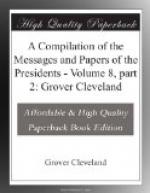In regard to the last branch of the inquiry made by the resolution of the Senate, I have to observe that the Constitution declares that “the President shall take care that the laws be faithfully executed,” and that “he shall be Commander in Chief of the Army and Navy of the United States, and of the militia of the several States when called into the actual service of the United States,” and that “Congress shall have power to provide for calling forth the militia to execute the laws of the Union, suppress insurrections, and repel invasions.” From which it appears that the Army and Navy are by the Constitution placed under the control of the Executive; and probably no legislation of Congress could add to or diminish the power thus given but by increasing or diminishing or abolishing altogether the Army and Navy. But not so with the militia. The President can not call the militia into service, even to execute the laws or repel invasions, but by the authority of acts of Congress passed for that purpose. But when the militia are called into service in the manner prescribed by law, then the Constitution itself gives the command to the President. Acting on this principle, Congress, by the act of February 28, 1795, authorized the President to call forth the militia to repel invasion and “suppress insurrections against a State government, and to suppress combinations against the laws of the United States, and cause the laws to be faithfully executed.” But the act proceeds to declare that whenever it may be necessary, in the judgment of the President, to use the military force thereby directed to be called forth, the President shall forthwith, by proclamation, command such insurgents to disperse and retire peaceably to their respective abodes within a limited time. These words are broad enough to require a proclamation in all cases where militia are called out under that act, whether to repel invasion or suppress an insurrection or to aid in executing the laws. This section has consequently created some doubt whether the militia could be called forth to aid in executing the laws without a previous proclamation. But yet the proclamation seems to be in words directed only against insurgents, and to require them to disperse, thereby implying not only an insurrection, but an organized, or at least an embodied, force. Such a proclamation in aid of the civil authority would often defeat the whole object by giving such notice to persons intended to be arrested that they would be enabled to fly or secrete themselves. The force may be wanted sometimes to make the arrest, and also sometimes to protect the officer after it is made, and to prevent a rescue. I would therefore suggest that this section be modified by declaring that nothing therein contained shall be construed to require any previous proclamation when the militia are called forth, either to repel invasion, to execute the laws, or suppress combinations against them, and that the President may make such call and place such militia under the control of any civil officer of the United States to aid him in executing the laws or suppressing such combinations; and while so employed they shall be paid by and subsisted at the expense of the United States.




